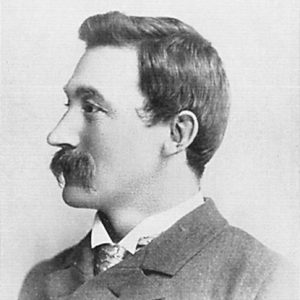calsfoundation@cals.org
James Richard Sovereign (1854–1928)
A native of Wisconsin, James Richard Sovereign lived in Arkansas only briefly at the end of the nineteenth century. During that time, however, he played a prominent role in politics and the labor movement at the state and national levels. By the early twentieth century, his prominence had faded, and he subsequently moved to the state of Washington, where he spent the remainder of his life.
Born on May 30, 1854, in Cassville, Wisconsin, to Thomas Clark Sovereign and Ruby Mitchell Sovereign, James R. Sovereign grew up primarily on his grandparents’ farm near Elgin, Illinois. At age sixteen, he migrated to Kansas and worked as a cattle driver on the Gonzales and Abilene cattle trail, which ran through Kansas and Texas. Sovereign also worked on the construction of bridges and tunnels in Kansas before moving to his father’s home in Cresco, Iowa, in the spring of 1872, where he worked on the family farm and attended high school. In 1874, he became a marble cutter. Two years later, he married Caroline A. Saucer, with whom he had four boys and two girls.
In 1881, Sovereign joined a local assembly of the Knights of Labor in Muscatine, Iowa, and three years later, he began working as a Knights organizer and editor of a Knights newspaper, the Industrial Leader of Dubuque, Iowa. He rose to the highest position in the Knights’ state hierarchy (State Master Workman), and Governor Horace Boies appointed him in 1890 to the first of two consecutive two-year terms as the Commissioner of Labor Statistics. In November 1893, at the Knights’ annual General Assembly convention in Philadelphia, a coalition of Midwestern agrarians and eastern socialists forced the resignation of longtime Knights General Master Workman Terence V. Powderly and replaced him with Sovereign, who was a leader among the agrarian faction that, by now, supported the Populist movement.
Sovereign’s own involvement with third-party, farmer-oriented politics dated back to at least 1882, when he ran unsuccessfully in Iowa as a Greenback-Labor Party candidate for the U.S. House of Representatives. In 1894, he campaigned for the Populists in the South. The following year, he purchased a farm in Sulphur Springs (Benton County), where he built a stone residence located near a cave that he would use for the cold storage of apples. Sovereign’s prominence as a national labor leader enabled him to assume a significant role in the Populist Party. He served in the Arkansas delegation to the Populists’ national convention in St. Louis, Missouri, in 1896, and he played a leading role in the party’s nomination of the free-silver supporter William Jennings Bryan of Nebraska (who had already been nominated by the Democratic Party) for president and Georgia Populist leader Tom Watson for vice president. In 1897, at a time when a state legislature chose the state’s U.S. senators, some Populists in the Arkansas legislature voted (to no avail) for Sovereign to occupy that office. Other Arkansas Populist leaders, however, strongly disapproved of Sovereign’s support for engaging in fusion with the Democratic Party; Populist newspaper editor (and 1898 gubernatorial candidate) W. Scott Morgan denounced him as a “Jumping Jack for the Democratic Party,” and the Populist state convention removed Sovereign from the Populist national executive committee in 1898.
Sovereign’s reign as the national leader of the by-then moribund Knights of Labor ended in November 1897. He made national headlines in July 1899 when he visited the site of the Coeur d’Alene, Idaho, miners’ strike and accused U.S. Army troops of committing atrocities. Sovereign subsequently returned to Sulphur Springs, where he farmed and sold insurance. Not long afterward, he moved to Ferry County, Washington, where he resumed his earlier career as a newspaper editor.
Sovereign died on December 16, 1928. In 1931, residents of Keller, Washington, erected a monument in his honor.
For additional information:
Durden, Robert F. The Climax of Populism: The Election of 1896. Lexington: University of Kentucky Press, 1965.
Hild, Matthew. Greenbackers, Knights of Labor, and Populists: Farmer-Labor Insurgency in the Late-Nineteenth-Century South. Athens: University of Georgia Press, 2007.
———. “Labor, Third-Party Politics, and New South Democracy in Arkansas, 1884–1896.” Arkansas Historical Quarterly 63 (Spring 2004): 24–43.
Niswonger, Richard L. Arkansas Democratic Politics, 1896–1920. Fayetteville: University of Arkansas Press, 1990.
Tuohy, Martin. “James R. Sovereign.” In The Encyclopedia of U.S. Labor and Working-Class History, edited by Eric Arnesen. New York: Routledge, 2007.
Wheeler, John M. “The People’s Party in Arkansas, 1891–1896.” PhD diss., Tulane University, 1975.
Matthew Hild
Georgia Institute of Technology
 Post-Reconstruction through the Gilded Age, 1875 through 1900
Post-Reconstruction through the Gilded Age, 1875 through 1900 James Soverign
James Soverign 



Comments
No comments on this entry yet.